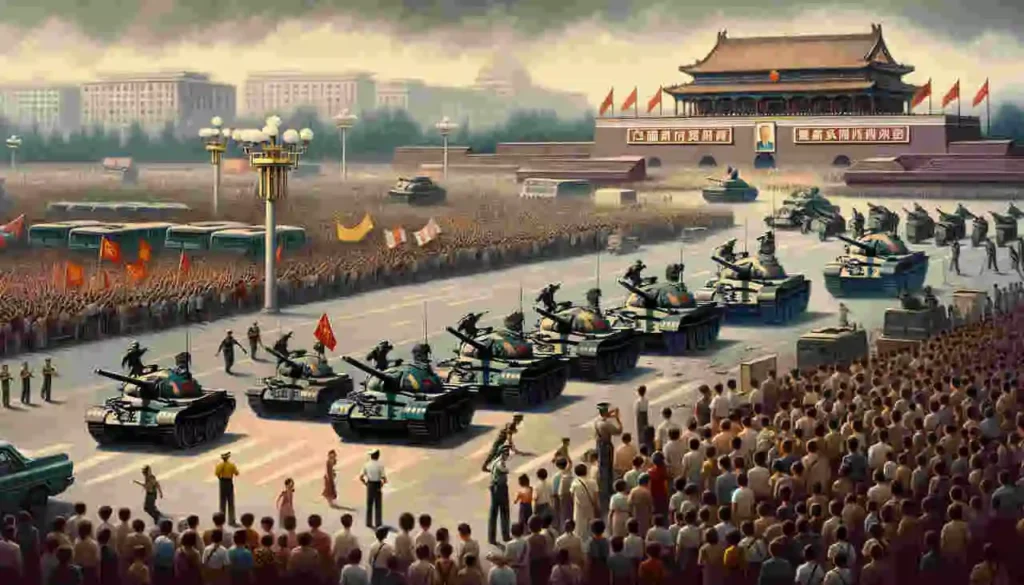This day marks the 35th anniversary of perhaps the darkest day in modern Chinese history, the Tiananmen Square Massacre. Although hard to imagine now, there was a time when China seemed on the verge of becoming a democratic state. Unfortunately, those fears were quashed in the ensuing bloodshed.
The Fight for Democracy

The Tiananmen Square Massacre, also known as the June Fourth Incident, was a pivotal and tragic event in modern Chinese history. Throughout the 1980s, China experienced rapid economic reforms under the leadership of Deng Xiaoping. These reforms led to significant economic growth but also caused inflation, corruption, and social inequality. Discontent grew, particularly among students and intellectuals who were frustrated by the lack of political reform and freedoms.
In April 1989, after the death of Hu Yaobang, a former Communist Party leader known for his reformist views, thousands of students began gathering in Tiananmen Square, Beijing. They initially came to mourn Hu but soon began demanding greater political freedoms, government accountability, and the end of corruption. The movement quickly gained support from various social groups, including workers, intellectuals, and even some government officials.
Over several weeks, the number of protesters swelled to over a million. The protests were largely peaceful, with demonstrators engaging in hunger strikes, sit-ins, and marches. However, the Chinese government viewed the movement as a threat to its authority and declared martial law in late May. Troops from the People’s Liberation Army (PLA) were ordered to clear the square.
On the night of June 3 and into the early hours of June 4, 1989, the Chinese military moved in with tanks and armed troops. The PLA used live ammunition against the unarmed protesters. The crackdown was brutal and swift, resulting in a large number of casualties. While the exact number of deaths remains unknown, estimates range from several hundred to several thousand.
Fortunately for the protestors, this happened around the time when multiple news foreign outlets were present in the country and were able to gather pictures, reports, and witness testimonies. This ensured that the rest of the world learned about the massacre.
The incident severely tarnished China’s international reputation, leading to widespread condemnation and sanctions from many Western countries. The Tiananmen Square Massacre became a symbol of the struggle for human rights and democracy in China. It also highlighted the Chinese government’s willingness to use force to maintain its grip on power.
Some of these accounts are still available for view today.
“Students returned from Tiananmen Square early in the morning. They said a massacre had taken place. It never occurred to the protestors that Chinese soldiers would shoot their own people. Students from Beijing University who made it back from the square carried pieces of blood-soaked concrete.”
-Unknown Protestor

The Legacy of Tiananmen Square Massacre
The Tiananmen Square Massacre had long-lasting effects on China and the world. In the immediate aftermath, the Chinese government launched a massive crackdown on political dissent. Thousands were arrested, and many faced harsh sentences, including long prison terms and even execution. The government also implemented strict censorship measures to suppress any discussion of the events of June 4, both within China and internationally.
Despite the government’s efforts to erase the memory of Tiananmen, the massacre remains a potent symbol of the fight for democracy and human rights. Every year, on the anniversary of the massacre, vigils and memorials are held around the world to honor the victims and to call for greater political freedoms in China.
Current Reflections and Continued Struggle
Thirty-five years later, the “Death of Chinese Democracy” still resonates deeply with many people around the world. While China has continued to grow economically and has become a major global power, the political landscape remains tightly controlled by the Communist Party. Human rights organizations and activists continue to call for political reforms and the protection of individual freedoms in China.
The legacy of the Tiananmen Square Massacre serves as a reminder of the high price that can be paid for the pursuit of democracy and the ongoing struggle for political reform. It underscores the importance of remembering and honoring those who sacrificed their lives in the hope of a better, more democratic future for China.
The Tiananmen Square Massacre is a stark reminder of the Chinese government’s willingness to use force to suppress political dissent. As we mark the 35th anniversary of this tragic event, it is important to reflect on the ongoing struggle for democracy and human rights in China. The memory of those who lost their lives in Tiananmen Square Massacre serves as a powerful symbol of the fight for a more just and democratic society.
If you want to create vintage letters that look fit for the queen, our Vintage Letter platform can let you create some beautiful letters that you can try here.

Pingback: George Washington's Urgent Letter After His Retreat
Comments are closed.